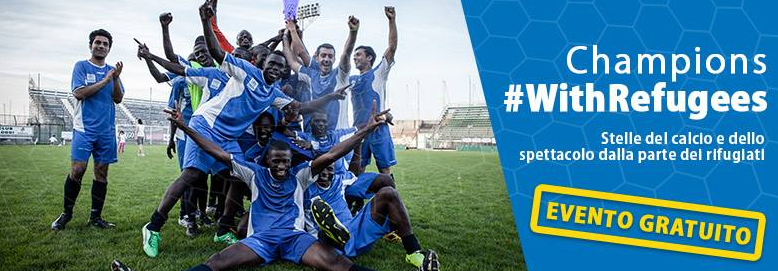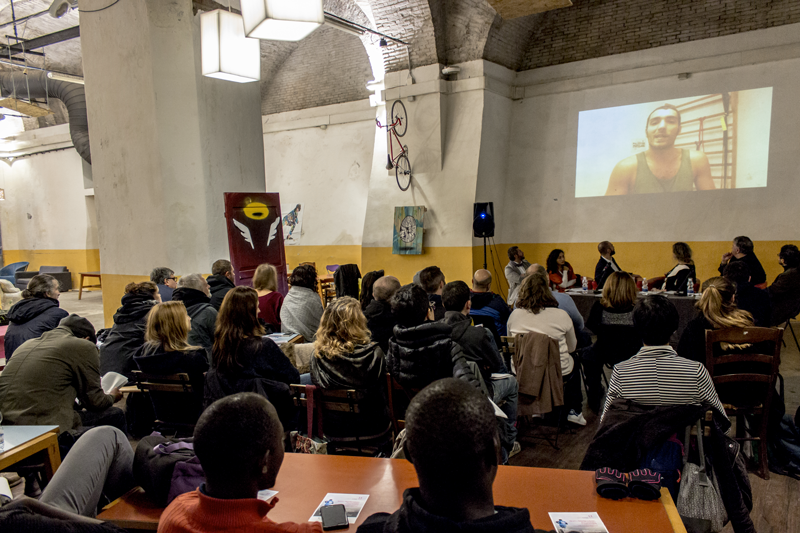03 agosto 2017
Tutti sulla stessa barca
Imparare a scuola il tema delle migrazioni non significa sottrarre tempo al programma canonico, ma sviluppare percorsi didattici che ruotino intorno a temi/problemi collegabili all’esperienza. Un’esperienza che vede la società farsi sempre più multiculturale: per questo motivo, la scuola si trova di fronte al difficile compito di ripensare se stessa di fronte ai rapidi processi di trasformazione del mondo attuale. In particolare essa cerca, appunto, una sua “via interculturale” di risposta sia ai processi migratori che investono i vari Paesi, sia ai bisogni di rigenerazione sociale e culturale. Le classi del ginnasio del liceo classico Minghetti di Bologna, ad esempio, hanno avuto la possibilità di autogestire, in collaborazione con alcuni insegnanti, dalle venti alle trenta ore annue in cui trattare un tema a scelta nell’ambito del progetto Coloriture.

Durante lo scorso anno scolastico 2016-17, la classe VG, con la guida della prof.essa Iacondini, ha deciso di approfondire l’argomento dei flussi migratori nel Mediterraneo, focalizzandosi anche sulle tematiche del razzismo e dello sport come strumento d’integrazione, pubblicando, a fine percorso, un giornalino su questi argomenti, dal titolo “Tutti sulla stessa barca”. Il tema dello sport è approfondito facendo riferimento al n. 84 della nostra rivista Africa e Mediterraneo dedicato al rapporto tra sport e immigrazione: l’attività sportiva offre, infatti, straordinarie possibilità di apertura, dialogo e accoglienza del diverso, e quindi garantisce opportunità di intercultura e la formazione di nuove identità molteplici e plurali che vanno a cambiare il volto della cittadinanza globale.
Parole chiave : Coloriture, Liceo classico Marco Minghetti, Sport
Trackback url: https://www.africaemediterraneo.it/blog/index.php/tutti-sulla-stessa-barca/trackback/
20 giugno 2017
La Champions #WithRefugees
Molte sono state le iniziative che, sotto l’egida della campagna #WithRefugees promossa da UNHCR, hanno condotto alla Giornata Mondiale del Rifugiato il 20 giugno: un modo per sensibilizzare l’opinione pubblica sul tema dei rifugiati e cercare di creare molteplici occasioni di incontro tra le comunità locali, i rifugiati e i richiedenti asilo. L’integrazione e la sensibilizzazione non possono che passare anche attraverso lo sport perché esso «consente di abbattere i muri e di costruire dei ponti, abbracciando la dimensione competitiva, ludica e socio-educativa», così scrive Raymond Siebetcheu in un articolo pubblicato sul n. 84 della rivista Africa e Mediterraneo, appunto, dedicato al rapporto tra sport e immigrazione.

Il 18 giugno allo stadio Tre Fondane di Roma si è svolta la Champions #WithRefugees, una giornata di grande calcio, organizzata da UNHCR insieme a Liberi Nantes e all’Associazione Italiana Calciatori (A.I.C.): si è trattata di una partita amichevole tra i Liberi Nantes, la prima squadra di calcio dal 2007 destinata a rifugiati politici e richiedenti asilo, e una selezione di stelle del calcio capitanate da Sulley Muntari, calciatore ghanese del Pescara divenuto recentemente simbolo globale della lotta al razzismo e all’intolleranza, e volti noti dello spettacolo. La storia dell’associazione Liberi Nantes, raccontata in una riflessione sui Mondiali antirazzisti di Vittorio Martone nel medesimo numero della rivista, è rappresentativa del percorso di lavoro per l’inclusione attraverso lo sport. Lo sport, infatti, offre straordinarie possibilità di apertura, di dialogo, di partecipazione civile e di socializzazione positiva tra i migranti e i membri della società che li accolgono.
Per maggiori informazioni sui Liberi Nantes: www.liberinantes.org
Parole chiave : #WithRefugees, Liberi Nantes, Sport
Trackback url: https://www.africaemediterraneo.it/blog/index.php/la-champions-withrefugees/trackback/
21 ottobre 2016
Sport e immigrazione: tra razzismo e convivenza.
Lo sport ha il potere di cambiare il mondo. Ha il potere di ispirare.
Esso ha il potere di unire le persone in un modo
in cui poche altre cose lo fanno. Parla ai giovani in una lingua che comprendono.
Lo sport può portare speranza dove una volta c’era solo disperazione.
(Nelson Mandela, 1st President of democratic South Africa)
Il 14 ottobre a Bologna si è tenuta la presentazione del nuovo dossier di Africa e Mediterraneo “Sport e immigrazione”, realizzato all’interno di Bologna cares!, la campagna di comunicazione del Sistema di protezione per richiedenti asilo e rifugiati (SPRAR). L’evento, che si è svolto presso gli spazi di Dynamo – La velostazione di Bologna e in collaborazione con il Terra di Tutti Film Festival, è stato condotto da Vittorio Martone e, dopo un’introduzione di Luca Rizzo Nervo, assessore alle Politiche sociali del Comune di Bologna, si è articolato intorno al tema dello sport come strumento efficace d’integrazione ed inclusione sociale per gli immigrati. Durante la presentazione sono intervenuti sociologi, giornalisti e rappresentanti dell’associazionismo sportivo, e sono stati proiettati due video che hanno raccontato alcune esperienze di richiedenti asilo impegnati in attività sportive: il pugilato e la thai boxe praticati da Ahmed e Camara, e il calcio della squadra del Papa Giovanni Footbal Club di Crespellano. Riflettendo in modo specifico sul ruolo delle pratiche socio-culturali che caratterizzano il quotidiano dei migranti, la sfida del nuovo dossier è focalizzata su uno spazio sociale innovativo, come lo sport, che offre straordinarie possibilità di apertura, di dialogo, di partecipazione civile e di socializzazione positiva tra i migranti e i membri della società che li accolgono. I luoghi di pratica sportiva possono diventare anche ambiti di discriminazione, dove possono avvenire episodi di razzismo: lo sport è, infatti, un campo in cui agiscono persone che sono alla ricerca di una propria identità culturale in una data realtà sociale, e la difficoltà sta nel tentare di superare il confine delle differenze, cercando di trasformare la pratica sportiva in un «luogo generativo di intercultura».
Per maggiori informazioni:
www.bolognacares.it/2016-africa-e-mediterraneo-n-84-116-sport-e-immigrazione
www.facebook.com/Bolognacares/?fref=ts
Per la visione dei video proiettati durante l’evento:
www.youtube.com/watch?v=Npc0Qt0Ki1k
www.youtube.com/watch?v=-CbCdRy3TZc
Parole chiave : Immigrazione, intercultura, Rivista Africa e Mediterraneo, Sport
Trackback url: https://www.africaemediterraneo.it/blog/index.php/sport-e-immigrazione-tra-razzismo-e-convivenza/trackback/
It is generally accepted that sport is one of the most relevant social phenomenon in today’s society. The idea of sport as a pure passion or something to discuss while enjoying a coffee belongs to the past: today, sport is mostly represented and nurtured through the media, which has transformed it into a consumable commodity which is at the same time a cultural product, show business, an educational and socialization instrument and much more. Moreover, sport represents a precious tool for social integration since it expresses the multicultural nature of Western society with all its contradictions.
From this perspective, one of the strongest representations sport has offered – and football in particular – was the victory of the French National Team during the FIFA World Cup in 1998, when the whole French nation identified with the French team, which was known as the “three-Bs team – black, blanc, beur”, and composed of French nationals with different ethnic backgrounds as a result of the social integration policy fostered by the Chirac Government. However, 20 years later, the terrorist attack of November 2015 at the Stade de France, one of the symbols of the 1998 World Cup, represents, according to Stefano Martelli (mentepolitica.it 21/11/2015), the failure of such a policy.
If football is then a significant experience for hundreds of millions of people (supporters and/or practitioners) – a “total social fact” in Marcel Mauss’ words – it is necessary to ask why Italian and European football «have witnessed an escalation in the quantity and type of racist actions which have involved many supporters, players, managers and representatives of football institutions. International organizations and institutions such as the European Union, the UN and the World Bank have stepped in to exhort the Member States to fight this phenomenon by considering it as part of a bigger perspective of the spreading of racist feelings among the public and the rise of xenophobic political parties and movements» (R. Pedretti, 2015). Players such as Mario Balotelli, Angelo Ogbonna and Stefano Osaka represent, thanks to the fame they enjoy, the visible tip of a much bigger and complex phenomenon that moves with difficulty in a world that still struggles to think in terms of integration and equality. The antidiscrimination campaigns run by organizations such as FARE (Football Against Racism in Europe) or initiatives like the Mondiali Antirazzisti (Antiracist World Games) do not seem to be successfully piercing the indifference of distracted ruling classes and heated supporters.
Sport is then a universal practice, but fraught with contradictions: despite being open to players of all origins, genders, social classes, many athletes in Europe are victims of injustice, discriminations, and racist events of different kinds. Despite that, 64% of European citizens consider sport (including competitive sport) as a tool with which to fight every form of discrimination (W. Gasparini, 2012).
The media narratives which tell the stories of successful athletes of foreign origin in Europe make the athletes nonetheless positive examples, and have a great impact both on their original society and on the second generation of migrants in Europe. Beyond the symbolic aspect and the production of meaning – and therefore of consensus – concerning champions and stars, the practice of sport represents a socializing element for citizens of all ages in the communities and neighbourhoods around sport associations (laic or religious). We are more and more aware of the need to fully include sport in the framework of social polices and to define more precisely what instruments can be deployed to make it a useful resource for the integration of citizens of foreign origin and for the fight against social exclusion. Recent examples of inclusion of asylum seekers within local sport associations of the territories where they are hosted seem to confirm such potential.
Pierre Bourdieu, who defined culture as an element that is experienced differently by people belonging to different classes, invited us to consider sport not only as a leisure activity but also as a social practice that – also through body control and body culture – is enacted in different shapes and produces specific effects that reflect the social position of the practitioner, who can then accumulate “cultural capital” (P. Bourdieu, 1978).
Starting with these assumptions, the issue 84 of the journal Africa e Mediterraneo aims to discuss sport as an instrument, practice, and socio-cultural resource which is able to facilitate social integration of migrant citizens and asylum seekers in the hosting countries and to increase the “cultural capital” and the “social capital” among migrants and natives at the local level.
Contributions dealing with the following subjects from different disciplinary approaches are welcome:
– terms and contents in the use of sport as an instrument for integration and fight against social exclusion of asylum seekers and migrants;
– sport practices by refugees and migrants in Europe;
– antidiscrimination campaigns in sport;
– sport as an instrument for social climbing for asylum seekers and migrants;
– debate and representation of sport in the African media;
– sport, racism and inclusion in social media and in the European mainstream media;
– successful examples of athletes from the Global South and their impact on countries of origin and young migrants.
Deadline for submission:
The proposals (max. 400 words) must be submitted no later than March 25th 2016 to the following email addresses s.federici@africaemediterraneo.it ; c.mara@africaemediterraneo.it.
The editorial committee will examine the proposals. If the proposal is accepted, the complete article with the related abstract (abstract max. 100 words, preferably in English) and a short biography of the author must be submitted by May 25th 2016.
Africa e Mediterraneo is a peer reviewed journal.
The articles and the proposals can be submitted in the following languages: Italian, English and French.



